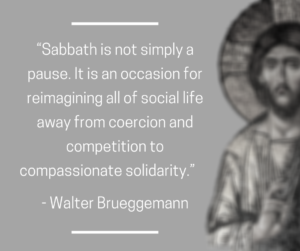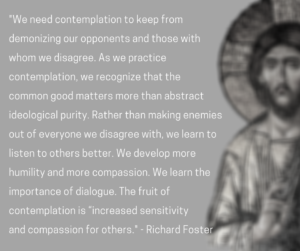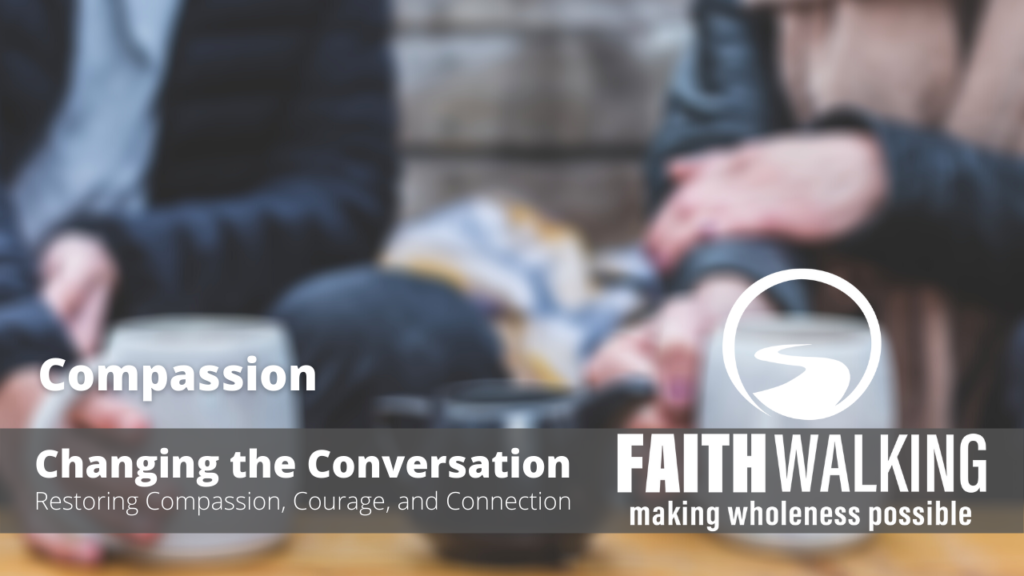When you think about the current public conversation, does the word “compassionate” ever come to mind? How often do any of us hear a compassionate tone in comments in social media, videos we watch about current events, or articles we read? Or in our own conversations with loved ones and friends when discussing those with whom we disagree, not to mention in conversations with those particular people? Compassion is sorely lacking in our public conversation, and its absence is blighting the spirit of our days. What is the impact of the divisive, dehumanizing, and contemptuous tone of the current conversation? It sucks the life out of us, leaving us exhausted, seething with resentment, depressed, and fearful.
Compassion is the human, caring response to suffering – for others and for self. When you lack compassion, you judge or try to fix others or yourself. Having compassion means being willing to see and feel others’ pain – to “suffer with” someone. Being compassionate starts with listening – truly listening to understand, empathize, validate. Compassion needs to be the starting point, the place from which we respond to ourselves and our world; it is a river of life.
Below is a quote from a member of our Keep Calm and Faithwalk On weekly group about a recent experience she had in the group that exemplifies the healing power of this kind of care:
“It was so comforting to be heard, affirmed, and blessed by your listening hearts and your curiosity. One of the best, and rarest, things is to be heard and honored – and not fixed or given unsolicited advice.” – Deborah
 When speaking of compassion, we must start with compassion for ourselves, or there will be nothing to give to others. Be kind to yourself during this crazy time, when you may feel you don’t have much to give; when day after day you find yourself getting little done; when you feel weary and bereft; when you grieve. What you are experiencing is the experience of so many of us. You can only do the best you can on any given day, and that “best” may look nothing like you think it should. Refuse to beat yourself up and allow shame to take over.
When speaking of compassion, we must start with compassion for ourselves, or there will be nothing to give to others. Be kind to yourself during this crazy time, when you may feel you don’t have much to give; when day after day you find yourself getting little done; when you feel weary and bereft; when you grieve. What you are experiencing is the experience of so many of us. You can only do the best you can on any given day, and that “best” may look nothing like you think it should. Refuse to beat yourself up and allow shame to take over.
Showing yourself compassion often means changing your internal dialogue – that little voice in your head. Do you say things to yourself that you would never say to someone else, especially not to someone you care about? What would it look like to speak to yourself with gentleness and kindness, and for that to be the tone that spills out into the conversation around you? Can you speak to yourself as you would that little child in your family photos? What would you say to 6-year-old you? Be a “safe” person for yourself, as well as for others. Recognize that everything is about what we are learning and how we are growing – and what others are learning and how they are growing. Offer yourself grace and compassion, and then let that grace and compassion flow to others.
 Compassion is a healing balm. We all long to feel truly listened to, heard, safe, and cared for, and even more so in these anxious, distracted, disconnected times. Think about when you come across a story about a compassionate act on social media or somewhere else – how it lifts your spirit and encourages your soul about the state of humanity. You may find yourself saying, “Ah, there is still good in the world!” How we long to go back to the days when it felt like there was a whole lot more of that! We are eager to share those stories when we come across them because we sense that others are as desperate for them as we are.
Compassion is a healing balm. We all long to feel truly listened to, heard, safe, and cared for, and even more so in these anxious, distracted, disconnected times. Think about when you come across a story about a compassionate act on social media or somewhere else – how it lifts your spirit and encourages your soul about the state of humanity. You may find yourself saying, “Ah, there is still good in the world!” How we long to go back to the days when it felt like there was a whole lot more of that! We are eager to share those stories when we come across them because we sense that others are as desperate for them as we are.
Compassion is at the core of the way of Jesus. We must ask ourselves whether we are available to offer compassionate community to others who are suffering in our world. Compassion can be cultivated! We can’t create a safe community and safe world for all of us without a commitment to giving and receiving the gift of compassion, for ourselves and for others.
Written by Angela Raley
____________
Please consider supporting Faithwalking through:

Giving. Help us reach our financial goal this year. We are praying and hoping for:
$35,000 by the end of 2020 in one-time gifts, plus:
– 60 monthly donors of $15 per month
– 40 monthly donors of $25 per month
– 20 monthly donors of $55 per month
Pledge or contact us to arrange your giving

Praying. Help us by committing to pray for us weekly.
We need discernment, wisdom, and provision of human and financial resources to make Faithwalking possible and accessible. Join our intercessor team.

Promoting. Help us promote the work of Faithwalking: like and share our posts, and post about our work.
There are several ways people can learn about Faithwalking at no cost. Help us promote:
The Faithwalking Facebook page
Please also help us promote our
Faithwalking Foundations modules and Ongoing Education offerings
Why Faithwalking?
We believe that God’s intended design is for wholeness in individuals, communities, and the world. We believe that God’s hope is for shalom to be present, which includes peace, unity, completeness, wholeness, and well-being for everyone and in everyone. God’s hope is for the Kingdom to come on earth as it is in heaven.
We live in a world of brokenness: People are chronically anxious and reactive, internally conflicted, frequently unloving, and regularly unconcerned about the common good. Many Christians are inconsistent in following the way of Jesus.
Our Mission
To make wholeness possible for individuals, communities, and the world.
We do this through a process of spiritual formation where people are equipped with tools to gain freedom from wounds of their past, grow in emotional maturity, and live lives of purpose on mission with God, so that they increasingly follow the way of Jesus by serving the poor, the marginalized, and those in need, working for the common good, and restoring individuals, social systems, communities, and nations to God’s intended design.
Our Vision
Our vision is for Faithwalking to be accessible to every person in the world so that participants become agents of wholeness in their own context.



